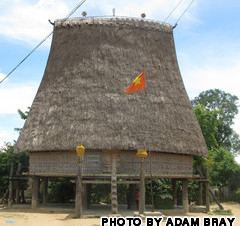| Think investing in Vietnam is all about Hanoi and Ho Chi Minh City? Think again. |
| Danang, Vietnam’s fourth most populous city, has been booming over recent years, thanks to its great geography, nestled between jungle-covered mountains and miles of sandy beaches.
While the beautiful setting has spurred tourism – resorts, villas and golf courses proliferate on the beachfront road south of the city – a growing number of factories have been established here to take advantage of Danang’s location in the centre of Vietnam. (danang hotels) Danang’s success is also down to the single-minded leadership of Nguyen Ba Thanh, the head of the local government, says Peter Ryder, chief executive of Indochina Capital, an investment firm that has pioneered a number of high-profile developments in the city. He says that Danang is regularly voted the best place to do business in Vietnam. It has the best infrastructure by far of any major urban area and the growth in per capita income has been ahead of other places in Vietnam. Nguyen Ba Thanh is the nearest Vietnam has to a Lee Kuan Yew. Like Hanoi, the capital, and Ho Chi Minh City, the main business centre, Danang’s economy has been growing way above the national trend rate of around 7% over the last decade. From 2006-2010, the city’s economy grew at around 11% per annum and it is targeting 13.5%-14.5% growth over the next five years. In contrast to the chaotic, traffic-clogged streets of Hanoi and Ho Chi Minh City, travelling around Danang, a city of 900,000 people, is a breeze, with wide boulevards, ring roads and bridges in all the right places. The decent infrastructure, combined with the stunning setting, is helping to attract a growing number of tourists and developers. A golf course designed by Colin Montgomerie, and backed by Indochina Capital, sits next to another course designed by Greg Norman, and backed by VinaCapital, a rival investment group. (Nick Faldo is getting in on the act 20 miles north, in a village called Lang Co). Small apartments in luxury beachfront developments are being sold for around $100,000 for a 50-year lease, while high specification villas are being picked up at over $1m, according to people working in the local property market. The vast majority of the buyers are the first generation of Vietnamese “second-homers”, mostly from Hanoi (where they like to pay in cash) and Ho Chi Minh City (where they prefer credit). But the rapid pace of construction has inevitably stoked fears about overdevelopment. A number of large projects have been halted ostensibly for lack of financing – although local cynics say that some speculators only want to give the impression of construction in order to get hold of the land before flipping it for a quick profit. Ryder says: ” We’re definitely concerned about over-building on the beachfront. What we’ve done has been unique enough so it will still wind up doing well. But we don’t have any plans to do any new projects.” Another developer argues that demand from cash-rich, wealthy Vietnamese who want a combined holiday home and investment will continue to support further development in Danang. With the currency continuing to depreciate against the dollar, inflation accelerating and the stock market in the doldrums, many well-off Vietnamese still feel that property is their best bet. Source: blogs.ft.com
|




